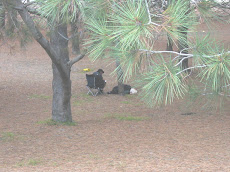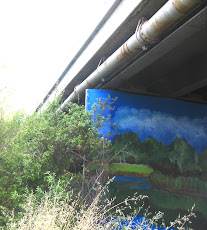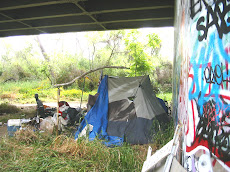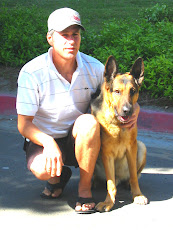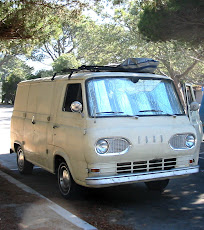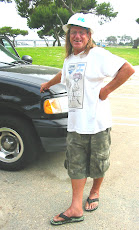
To tell the truth, I do not know who I am outside of writing this blog, doing yoga, swimming, running a mile a few times a week, and generally doing whatever comes to mind that might be useful in moving my life past this homeless episode. Sometimes I am simply overwhelmed, and I don't think I can take another minute: the destitution swells up in the back of my mouth as my mind floats over all the things I have ever loved as though I were dead. I feel slightly nauseated and as though I might pass out.
But I am now on top of a hill in Point Loma with the widest view of the Pacific in all of San Diego. The ocean spreads north and south and meets the sky in the same shade of blue, distinguishable only by the shimmering silken fabric of waves. There is a college here with an all-weather track where I will outrun my nasty goblins who can barely make it a quarter mile.
Maybe it's me. Maybe it's the situation. All I know is there are some awful days, days so blue and beautiful that sometimes the contrasts with my terrible interior are surreal. On those days, the overly-bright sunlight gives grass and leaves the translucence of a vision of the afterlife. On those days, I could not tell you with any certainty that being housed would make a difference, though we all want to think that.
Moving past grief is in fits and starts, and the fits are ugly. They down me for days at a time, and I crave rest, sugar, and the people I know, most of whom live elsewhere. I just want to be slouching around a big house in my PJs, but all I have is this truck. I curse homelessness and kick my own tires. It is at these times, too, that I do not have the energy to think or act on getting out of the situation.
Sure, I have some good recommendations for other people who face homelessness, but that only means I have had the experience: it does not mean I have conquered my demons and am on the way toward a life of better homes and gardens. Successes at homelessness are ephemeral, given the chances that something is going to change in the next hour. Not that the change would be a surprise. It is just that there is not much I am going to do about the possibility of outcomes I won't like. I live with that prospect and hope it is not today or tomorrow that I have to face the utter demise of my truck, for example.
And friendship is almost impossible out here. I am always hustling, always on the phone, always driving somewhere, always looking for a new place to park the truck: I'm on the hunt. Even if I meet someone whom I like, I am not at leisure, nor much inclined, to chit-chat. It is hard to tell what one has in common with another under the conditions of homelessness. We do not share a neighborhood, nor a workplace, nor do we have children enrolled in the same school. Life is impromptu and inconvenient out here, and I must stay sharp and more than a few feet ahead of probabilities.
Now, having given sufficient preface, having expanded upon what defeats me, I feel more comfortable in offering my list of ideas and suggestions for living a relatively successful homeless life. These are not hard, pat guidelines which would be truly impossible to create with the instabilities and uncertainties of homelessness; and not all of my suggestions will be relevant to another's circumstance. There are also gender differences in the way homelessness is approached, and I cannot speak to substance abuse since it is not part of my experience.
Therefore, my opening assumption is that something catastrophic and quite out of your control has happened to put you in the street, something that made you lunatic, frantic, stressed out, and unable to cope as you once did. You are disabled right now, though you are capable enough, with a little help, of being healthy once again.
Perhaps, the changes you are experiencing are scaring you. I used to wake up in the middle of the night unable to breathe. I was not getting oxygen, which made me wonder if I were really awake or in a dream. Whichever it was, I had to get some air. I got out of bed and went outdoors until the cool evening's freshness brought me out of emotional impairment and back to cognitive normalcy. These episodes were far too frequent.
By day, I was driving maniacally. I was getting stopped once a week by the highway patrol for speeding and running stop lights; and as I reported in a previous blog, the cost of tickets was mounting to a vast sum. I could not seem to put a brake, so to speak, on this driving behavior. I could not control it, and that was another reason therapy looked so good.
After all, I was becoming unrecognizable even to myself. I might have been crazy at other times in my life and didn't know it, and I would not have taken anyone else's word for it. This time, beyond any doubt, I needed help. Fortunately, I was aware of the newer therapies that are not just talk.
So, in the first place, hopefully, you recognize that you must have help. The first line of defense is the support of a good therapist whom you believe has the talent to work with you, who can handle someone outside the mainstream, and is not put off by your homelessness. The newer therapies that are working for me are called Eye Movement Desensitization and Reprogramming (EMDR); Brainspotting, an advanced form of EMDR; and Advanced Integrative Therapy (AIT), also known as Seemorg Matrix work. Impressive, huh? They really are. These therapies have clearly defined and proven processes that work on both conscious and subconscious levels of the mind to clear away trauma.
Next, be kind to yourself, and you may come to find how very difficult that is to do. You may discover you have never been all that kind to yourself, and the eremitic nature of homelessness will teach you such things. My advice is to give yourself as much rest as needed, even though it may seem excessive, and eat whatever you want to eat. Do whatever it takes to elevate your mood. Dare to talk to people you do not know. Talk to animals and trees. Talk to yourself. Give yourself pep rallies. I admit I talked to myself in the beginning because I was frightened and I was all I had by way of company.
If it doesn't feel good, don't do it. This is your unique situation and your opportunity to stop the world and get off for a while, so take advantage of the freedom to do what you really want to do. If you are able to work for money, find a nice establishment run by nice people with whom to work. Do not waste your precious life force on anyone who has a lousy attitude toward employees. Do not accept employment from people who think employees are slaves who are there to do their bidding and that you ought to be grateful for the pittance they are paying you. Even if the job pays very little, but is something you think you would enjoy, take it. You can always quit if things do not go the way you expected.
Yes, I said quit. You are in no position to put up with any kind of insanity.
Be your own best friend. This maxim is the parent of all the others. I place it here because you will not know how to do this straight off. However, you are in a process of change that will teach you how to do it and get better at it as time goes by. You will make deep discoveries in therapy that will raise your consciousness, and you will be making small everyday efforts to take care of yourself by doing only what you want to do and what feels good. You will come to find yourself and then become hungry for your own self-realization.
Find good work. You will need the company of other people in order to see your progress and to find out who you really are. Of course, you must stick to the maxim of only doing what you want to do. Whether your work with other people pays or not, the point is that it will serve as a creative outlet for your self-expression. Having work to do also keeps the mind and the emotions engaged in something other than your own problems. Sure, you have them. But you do not need to talk to them each and every day and let them eat away time that could be better spent. Besides, as you already know, your problems are boring; it's the same old stuff.
But, you must allow yourself to feel whatever you are feeling, even if it seems like self-pity. Who cares? It's your soul, and you are the only one who walks your path. Get righteously in favor of taking your own side. It helps sometimes to imagine that there is someone who really loves you. So you ask yourself what that person would do for you or how they would think about you out of their great love and appreciation; and whatever that is, do it and think it. Finally, you will come to see your own true worth even if it started out as pretending.
Start exploring avenues that may have been cut off or to which you previously had no access. Maybe you would really like to go to school to study a topic that has fascinated you for a long time. Maybe you have always wanted to learn to swim, roller blade, surf, or rock-climb. Maybe you have always wanted to learn to sew, cook gourmet food, or write a novel. Find a place to start and stick with your new venture until you are satisfied with your progress or discover you do not like it as much as you thought you would. And that's OK. You are just experimenting with expanding your life along the lines of doing only what you want and like to do.
Get some exercise every day. This is one of the best remedies for poor sleep, over-eating, sluggishness, temptations to alcohol or drugs, and a myriad of bad habits that impede one's ability to think and act. Thinking and acting can be difficult enough under ordinary circumstances, but let's face it, your situation requires staying out of stupors.
Make friends as far as possible within the limits of homelessness, a state comprised of the most peripatetic people on earth. Still, it is nice to know you are not alone. I have actually slept better in a parking lot knowing someone else was out there sleeping in their vehicle, too. Homelessness does not always have to feel desperate.
What I am saying here is not about chasing the American Dream from the lowest rung of the socio-economic ladder. Not at all, and I doubt it is your life-goal in any case. Rather, it is about taking responsibility for yourself because few others will or can. The post-Reagan United States offers no way back up, but what one can hunt up or contrive on one's own. You are now a hunter/gatherer.
Stay as sharp as you possibly can, and I do not mean freshly-pressed, go-to-work uniforms and shiny resumes. No, I mean living with dignity and self-respect and in tune with your own needs. That includes money. If you know you need it, find it. I have infinite respect for the homeless people who panhandle at the major intersections in town. I always give them money if for no other reason than to set an example.
For one thing, I believe all Americans need to see homelessness with their own eyes for the object lesson it presents. To all intents and purposes, the increase and spread of homelessness in the United States was engineered, as it was a direct result of Reaganomics: trickle down, changes in the tax code that benefited only the wealthy, and corporate welfare.
Secondly, I believe it is a moral good for drivers to be confronted with homelessness at every intersection and to feel its imposition on their daily routine. Eventually, they are going to want someone to do something about it; and whatever they are thinking, at least they are thinking. For truly, not since the Great Depression has this country had homelessness on this scale, though the homeless today may be worse off since their tent cities get removed regularly by police action. The "Hoovervilles" of the 1930s seem downright cozy, safe, and secure by comparison.
My soapbox preachments are a bonus, and I do not expect anyone else who is homeless to carry a banner and get out there and march. Your primary concern should be about you and the quality of your own life which you already know never has to be at the expense of another.
 er, almost anything but that.
er, almost anything but that.




